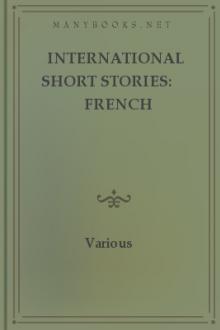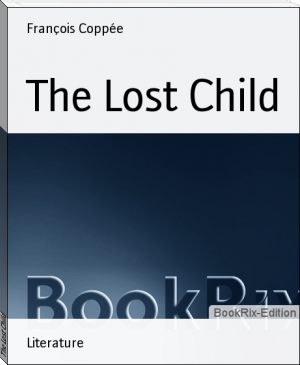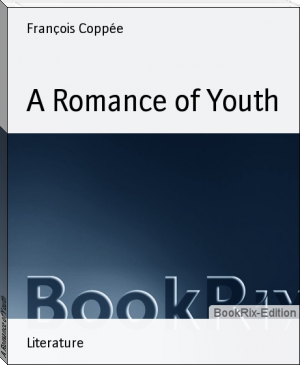International Short Stories: French - - (new books to read .TXT) 📗

- Author: -
- Performer: -
Book online «International Short Stories: French - - (new books to read .TXT) 📗». Author -
This scene formed so striking a contrast to the one which Don Juan had just left that he could not help shuddering. He felt cold when, on approaching the bed, a sudden flare of light, caused by a gust of wind, illumined his father’s face. The features were distorted; the skin, clinging tightly to the bones, had a greenish tint, which was made the more horrible by the whiteness of the pillows on which the old man rested; drawn with pain, the mouth, gaping and toothless, gave breath to sighs which the howling of the tempest took up and drew out into a dismal wail. In spite of these signs of dissolution an incredible expression of power shone in the face. The eyes, hallowed by disease, retained a singular steadiness. A superior spirit was fighting there with death. It seemed as if Bartholomeo sought to kill with his dying look some enemy seated at the foot of his bed. This gaze, fixed and cold, was made the more appalling by the immobility of the head, which was like a skull standing on a doctor’s table. The body, clearly outlined by the coverlet, showed that the dying man’s limbs preserved the same rigidity. All was dead, except the eyes. There was something mechanical in the sounds which came from the mouth. Don Juan felt a certain shame at having come to the deathbed of his father with a courtesan’s bouquet on his breast, bringing with him the odors of a banquet and the fumes of wine.
“You were enjoying yourself!” cried the old man, on seeing his son.
At the same moment the pure, high voice of a singer who entertained the guests, strengthened by the chords of the viol by which she was accompanied, rose above the roar of the storm and penetrated the chamber of death. Don Juan would gladly have shut out this barbarous confirmation of his father’s words.
Bartholomeo said: “I do not grudge you your pleasure, my child.”
These words, full of tenderness, pained Don Juan, who could not forgive his father for such goodness.
“What, sorrow for me, father!” he cried.
“Poor Juanino,” answered the dying man, “I have always been so gentle toward you that you could not wish for my death?”
“Oh!” cried Don Juan, “if it were possible to preserve your life by giving you a part of mine!” (“One can always say such things,” thought the spendthrift; “it is as if I offered the world to my mistress.”)
The thought had scarcely passed through his mind when the old spaniel whined. This intelligent voice made Don Juan tremble. He believed that the dog understood him.
“I knew that I could count on you, my son,” said the dying man. “There, you shall be satisfied. I shall live, but without depriving you of a single day of your life.”
“He raves,” said Don Juan to himself.
Then he said, aloud: “Yes, my dearest father, you will indeed live as long as I do, for your image will be always in my heart.”
“It is not a question of that sort of life,” said the old nobleman, gathering all his strength to raise himself to a sitting posture, for he was stirred by one of those suspicions which are only born at the bedside of the dying. “Listen, my son,” he continued in a voice weakened by this last effort. “I have no more desire to die than you have to give up your lady loves, wine, horses, falcons, hounds and money——”
“I can well believe it,” thought his son, kneeling beside the pillow and kissing one of Bartholomeo’s cadaverous hands. “But, father,” he said aloud, “my dear father, we must submit to the will of God!”
“God! I am also God!” growled the old man.
“Do not blaspheme!” cried the young man, seeing the menacing expression which was overspreading his father’s features. “Be careful what you say, for you have received extreme unction and I should never be consoled if you were to die in a state of sin.”
“Are you going to listen to me?” cried the dying man, gnashing his toothless jaws.
Don Juan held his peace. A horrible silence reigned. Through the dull wail of the snowstorm came again the melody of the viol and the heavenly voice, faint as the dawning day.
The dying man smiled.
“I thank you for having brought singers and music! A banquet, young and beautiful women, with dark locks, all the pleasures of life. Let them remain. I am about to be born again.”
“The delirium is at its height,” said Don Juan to himself.
“I have discovered a means of resuscitation. There, look in the drawer of the table—you open it by pressing a hidden spring near the griffin.”
“I have it, father.”
“Good! Now take out a little flask of rock crystal.”
“Here it is.”
“I have spent twenty years in——”
At this point the old man felt his end approaching, and collected all his energy to say:
“As soon as I have drawn my last breath rub me with this water and I shall come to life again.”
“There is very little of it,” replied the young man.
Bartholomeo was no longer able to speak, but he could still hear and see. At these words he turned his head toward Don Juan with a violent wrench. His neck remained twisted like that of a marble statue doomed by the sculptor’s whim to look forever sideways, his staring eyes assumed a hideous fixity. He was dead, dead in the act of losing his only, his last illusion. In seeking a shelter in his son’s heart he had found a tomb more hollow than those which men dig for their dead. His hair, too, had risen with horror and his tense gaze seemed still to speak. It was a father rising in wrath from his sepulchre to demand vengeance of God.
“There, the good man is done for!” exclaimed Don Juan.
Intent upon taking the magic crystal to the light of the lamp, as a drinker examines his bottle at the end of a repast, he had not seen his father’s eye pale. The cowering dog looked alternately at his dead master and at the elixir, as Don Juan regarded by turns his father and the phial. The lamp threw out fitful waves of light. The silence was profound, the viol was mute. Belvidéro thought he saw his father move, and he trembled. Frightened by the tense expression of the accusing eyes, he closed them, just as he would have pushed down a window-blind on an autumn night. He stood motionless, lost in a world of thought.
Suddenly a sharp creak, like that of a rusty spring, broke the silence. Don Juan, in his surprise, almost dropped the flask. A perspiration, colder than the steel of a dagger, oozed out from his pores. A cock of painted wood came forth from a clock and crowed three times. It was one of those ingenious inventions by which the savants of that time were awakened at the hour fixed for their work. Already the daybreak reddened the casement. The old timepiece was more faithful in its master’s service than Don Juan had been in his duty to Bartholomeo. This instrument was composed of wood, pulleys, cords and wheels, while he had that mechanism peculiar to man, called a heart.
In order to run no further risk of losing the mysterious liquid the skeptical Don Juan replaced it in the drawer of the little Gothic table. At this solemn moment he heard a tumult in the corridor. There were confused voices, stifled laughter, light footsteps, the rustle of silk, in short, the noise of a merry troop trying to collect itself in some sort of order. The door opened and the prince, the seven women, the friends of Don Juan and the singers, appeared, in the fantastic disorder of dancers overtaken by the morning, when the sun disputes the paling light of the candles. They came to offer the young heir the conventional condolences.
“Oh, oh, is poor Don Juan really taking this death seriously?” said the prince in la Brambilla’s ear.
“Well, his father was a very good man,” she replied.
Nevertheless, Don Juan’s nocturnal meditations had printed so striking an expression upon his face that it commanded silence. The men stopped, motionless. The women, whose lips had been parched with wine, threw themselves on their knees and began to pray. Don Juan could not help shuddering as he saw this splendor, this joy, laughter, song, beauty, life personified, doing homage thus to Death. But in this adorable Italy religion and revelry were on such good terms that religion was a sort of debauch and debauch religion. The prince pressed Don Juan’s hand affectionately, then all the figures having given expression to the same look, half-sympathy, half-indifference, the phantasmagoria disappeared, leaving the chamber empty. It was, indeed, a faithful image of life! Going down the stairs the prince said to la Rivabarella:
“Heigho! who would have thought Don Juan a mere boaster of impiety? He loved his father, after all!”
“Did you notice the black dog?” asked la Brambilla.
“He is immensely rich now,” sighed Bianca Cavatolini.
“What is that to me?” cried the proud Veronese, she who had broken the comfit dish.
“What is that to you?” exclaimed the duke. “With his ducats he is as much a prince as I am!”
At first Don Juan, swayed by a thousand thoughts, wavered toward many different resolutions. After having ascertained the amount of the wealth amassed by his father, he returned in the evening to the death chamber, his soul puffed up with a horrible egoism. In the apartment he found all the servants of the household busied in collecting the ornaments for the bed of state on which “feu monseigneur” would lie to-morrow—a curious spectacle which all Ferrara would come to admire. Don Juan made a sign and the servants stopped at once, speechless and trembling.
“Leave me alone,” he said in an altered voice, “and do not return until I go out again.”
When the steps of the old servant, who was the last to leave, had died away on the stone flooring, Don Juan locked the door hastily, and, sure that he was alone, exclaimed:
“Now, let us try!”
The body of Bartholomeo lay on a long table. To hide the revolting spectacle of a corpse whose extreme decrepitude and thinness made it look like a skeleton, the embalmers had drawn a sheet over the body, which covered all but the head. This mummy-like figure was laid out in the middle of the room, and the linen, naturally clinging, outlined the form vaguely, but showing its stiff, bony thinness. The face already had large purple spots, which showed the urgency of completing the embalming. Despite the skepticism with which Don Juan was armed, he trembled as he uncorked the magic phial of crystal. When he stood close to the head he shook so that he was obliged to pause for a moment. But this young man had allowed himself to be corrupted by the customs of a dissolute court. An idea worthy of the Duke of Urbino came to him, and gave him a courage which was spurred on by lively curiosity. It seemed as if the demon had whispered the words which resounded in his heart: “Bathe an eye!” He took a piece of linen and, after having moistened it sparingly with the precious liquid, he passed it gently over the right eyelid of the corpse. The eye opened!
“Ah!” said Don Juan, gripping the flask in his hand as we clutch in our dreams the branch by which we are suspended over a precipice.
He saw an eye full of life, a





Comments (0)